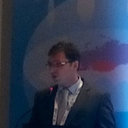Role of Laryngopharyngeal Reflux in Complications of Tonsillectomy in Pediatric Patients.
Parole chiave
Astratto
Tonsillectomy and tonsillectomy with adenoidectomy are among the most common surgical procedures in otolaryngology practice. Gastroesophageal reflux was identified as a risk factor for complications in tonsillectomy. This prospective study was designed to assess the role of reflux in the development of complications following tonsillectomy in pediatric patients. Children (n = 60) who underwent tonsillectomy with adenoidectomy were divided into two groups, i.e., the laryngopharyngeal reflux (LPR) group and control group. Patients with LPR were identified by reflux symptom index and reflux finding score. Pain, hemorrhage, fever, nausea, vomiting, fever, dehydration, infection, and pulmonary problems were evaluated post operatively. The mean lengths of hospital stay were 2.11 days in the reflux group and 1.05 days in the control group. The difference was statistically significant. Visual analogue scores of both groups were similar on day 1 but it was significantly higher on day 7 and 14 in LPR group. Nausea and vomiting rates were 11.1 and 9.5 % for the patients in the LPR group and the controls, respectively. The difference between the two groups was not significant. The mean fever was 37.6 °C in the reflux group and 37.3 °C in the controls, which were not significantly different. 19 % of the controls and 22 % of the LPR group patients were readmitted. This difference was not statistically significant. There were two cases of bleeding in the reflux group, while no bleeding occurred in the control group. This difference was significant statistically. LPR is a risk factor for complications following tonsillectomy.



